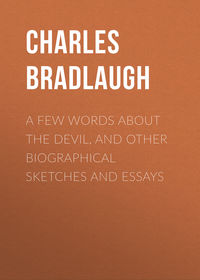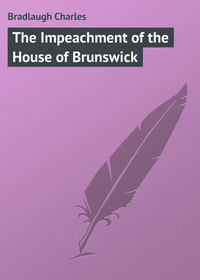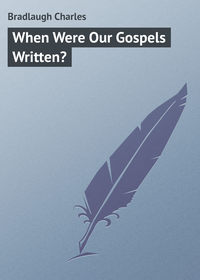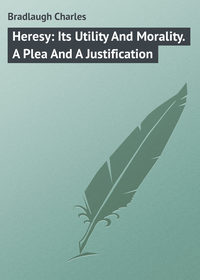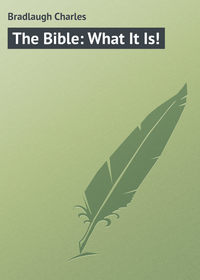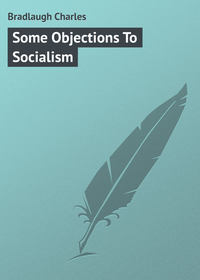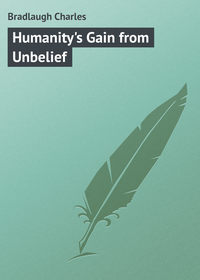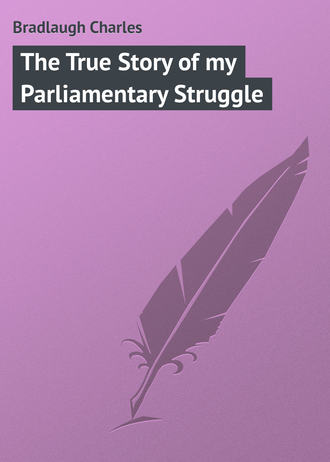 полная версия
полная версияThe True Story of my Parliamentary Struggle
You have, since the adoption of that resolution, made various attempts to force the House to admit you to a seat, while still maintaining its objection; and those attempts have, on more than one occasion, led to scenes of a very indecent and disorderly character. In its anxiety to prevent the recurrence of such scenes, the House has felt itself obliged to adopt measures of rigid exclusion, which it would gladly have avoided.
I do not think it necessary to enter into the details of these scenes.
I am, however, obliged to take notice of your allegation that my action on the 11th February involved a breach of an arrangement previously made through Mr. Winn.
The arrangement which I authorised Mr. Winn to make in my name, and which he did make in a letter to Mr. Labouchere, was as follows:
“If Mr. Bradlaugh will write you a letter to the effect that he will not go up to the table to take the oath, nor make any other move with regard to his seat until Monday, February 11th, and will do so on that day, say immediately after questions, I am quite sure that Sir Stafford will neither move anything himself respecting Mr. Bradlaugh’s seat, nor employ anyone else to do so, previous to that day.”
The meaning of this is perfectly obvious, and it was in strict conformity with it that I myself abstained, and urged my friends to abstain, from taking any step whatever in relation to Mr. Bradlaugh until the day named. When, upon that day, you came forward in defiance of the Speaker’s repeated calls to order, and began to go through the form of taking the oath, I had no option but to support the Chair, and to support also the repeatedly pronounced resolutions of the House in former sessions.
I do not take notice of other passages in your letter reflecting on the course of the majority, and more particularly of myself.
But I will add, in conclusion, what your letter does not show, that your exclusion from the precincts of the House is terminable at any moment when you may be willing to undertake not to disturb the proceedings of the House. The inconveniences of which you complain are inconveniences which you might, if you chose, put an end to to-morrow.
I have the honor to remain,Your obedient servant,Stafford H. Northcote.C. Bradlaugh, Esq., M.P.
23, Circus Road, St. John’s Wood, London, N.W.,March 7th, 1884.
To the Right Hon. Sir Stafford Northcote, Bart, M.P.
Sir, – In reply to your favor of the 4th instant, in which you say that the House held me to be incompetent to take the oath, will you permit me to answer: 1. That the question of competence or incompetence to take the oath is one of law, fit only for the decision of a judicial tribunal, to which tribunal I have always desired and endeavored to refer such question. 2. That if the “principle deliberately adopted” by a large majority of the members of the House of Commons had been that they desired to prevent “a profanation of the oath,” then they ought, during the sessions of 1882 – 1883, to have gladly facilitated the passage of the Affirmation Bill, which would have prevented the necessity for the fulfilling by me of that which you describe as profanation, but which I contend is the duty imposed on me by law.
In your very temperate historic narrative, you omit the fact that when the House passed its resolution of the 23rd June, 1880, it had before it my declaration, made three weeks earlier, in answer to question 102 of the second Select Committee:
“Any form that I went through, any oath that I took, I should regard as binding upon my conscience in the fullest degree. I would go through no form, I would take no oath, unless I meant it to be so binding.”
And as you refer to my letter of the 20th May, printed in the report of that committee, it is also fair to recall my answer thereon on the same day to question 197:
“I ask the Committee in examining it to take it complete, not to separate one or two words in it and to take those without the countervailing words, and to remember that in this letter I declare that the oath, if I take it, would bind me, and I now repeat that in the most distinct and formal manner; that the Oath of Allegiance, viz.: ‘I do swear that I will be faithful and bear true allegiance to her Majesty Queen Victoria, her heirs and successors, according to law,’ will, when I take it, be most fully, completely, and unreservedly binding upon my honor and conscience; and I crave leave to refer to the unanimous judgment of the full Court of the Exchequer Chamber, in the case of Miller v. Salomons, 17th Jurist, page 463, and to the case of the Lancaster and Carlisle Railway Company v. Heaton, 4th Jurist, new series, page 708, for the distinguishment between the words of asseveration and the essential words of an oath. But I also desire to add, and I do this most solemnly and unreservedly, that the taking and subscribing, or repeating of those words of asseveration, will in no degree weaken the binding effect of the oath on my conscience.”
In your reference to my attempts to take the seat to which I am by law entitled, you have omitted to state that on the 27th April, 1881, you personally advised me to wait for legislation, and that when I did so wait, your friends of the majority and yourself prevented such legislation.
In recalling the arrangement made by Mr. Winn on your behalf, you have omitted his most explicit and latest letter:
“Nostell Priory, Wakefield,“January 28th, 1884.“Dear Mr. Labouchere, – On the distinct understanding and agreement that Mr. Bradlaugh does not come to the table to take the oath, or adopt any other course with reference to his seat in the House of Commons, until immediately after questions on Monday, the 11th of February next, and that he will on that day and time come to the table, as he has intimated his intention of doing, I am prepared to say that Sir Stafford Northcote will not previous to Monday the 11th make any motion hostile to Mr. Bradlaugh, nor support any motion coming from any of our independent friends on the subject.
“I am, yours very truly,“Row. Winn.“H. Labouchere, Esq., M.P.”
My charge against you is that, despite this agreement, you had gone down to the House with a resolution prepared beforehand, and by its wording showing that it was intended to be moved before I should be able to get near the table to which you had made me specifically agree then to come.
You conclude by saying that I can put an end to any personal inconvenience by undertaking not to disturb the proceedings of the House. I gave such an undertaking last year in express words; it is printed in the journals of the House, and you did not accept it. Immediately before you moved your resolution of 21st February, you heard Mr. Speaker read my undertaking to do nothing until a legal decision was obtained. This you refused, and I have no reason to suppose that any second offer from me would be accepted. If what you really desire is that, if the law decides in my favor, I shall none the less join in your insult to my constituents by refusing to try to serve in the Parliament to which they have lawfully returned me, I can only say that I will never give such an undertaking.
I have the honor to be, Sir,Your most obedient Servant,C. Bradlaugh.THE LATEST CONSTITUTIONAL STRUGGLE: A REGISTER OF EVENTS
THE LATEST CONSTITUTIONAL STRUGGLE
1880April 2nd. – After twelve years’ fight and three repulses, Mr. Charles Bradlaugh is elected member of Parliament for Northampton. The polling was as follows: —

The Weekly Dispatch said: Mr. Bradlaugh’s achievement of the position he has been aiming at so long and so zealously is a notable sign of the times. Whatever his critics may think of him, he will enter Parliament as the representative of a vastly larger constituency than the whole electorate or the whole population of Northampton.
The Birmingham Daily Mail: Mr. Bradlaugh holds extreme views on some subjects, but he will none the less be a useful man in Parliament, his unflinching courage in the exposure of abuses being unquestionable.
The Standard: Mr. Bradlaugh, now that he has got to the House of Commons, is not likely to efface himself in speechless obscurity.
The Southampton Times: The most signal and portentous triumph is that which has been achieved by Mr. Bradlaugh. His election shows what the unity of the Liberal party must have been.
The Christian World: His contributions to the discussions of the House may not be without value.
During the election Mr. Samuel Morley telegraphed to Mr. Labouchere as follows: I strongly urge necessity of united effort in all sections of Liberal party, and the sinking of minor and personal questions, with many of which I deeply sympathise, in order to prevent the return, in so pronounced a constituency as Northampton, of even one Conservative.
April 15th. – Mr. S. Morley, speaking at Bristol said, respecting his telegram to Northampton: He made no reference to candidates, nor did the friend who wrote the telegram go into detail, but he advised union. Those who had known him all his life would believe that he viewed with the intensest repugnance the supposed opinions, both social and religious, of one of the candidates. Afterwards, writing to the Record, Mr. Morley said he deeply regretted his telegram.
The Weekly Dispatch, commenting on Mr. Morley’s conduct, said: Let the bigots who have taken him to task for his temporary aberration from the path of pharisaism make what they can of his pitiful excuse. Other people can only regret that a man so useful in many ways, both as a politician and a philanthropist, should show himself so narrow-minded.
The Edinburgh Evening News: In their disappointment, the defeated party have eagerly caught at the election of Mr. Bradlaugh as supplying the most pungent taunt that can be thrown at their victorious opponents.
The Sheffield Telegraph: Bradlaugh is an M.P. … the bellowing blasphemer of Northampton.
Mr. Bradlaugh announces that he considers he is legally entitled to avail himself of the Freethinkers’ affirmation, and that there is some reason to hope that other members will join him in that course.
April 17th. —Sheffield Independent’s “London Correspondent” says: Tenets which constitute the religious faith of Mr. Bradlaugh are understood to constitute an insuperable difficulty in the way of his being sworn a member of “the faithful Commons.”
April 29th. – Parliament opens.
May 3rd. – At the table of the House Mr. Bradlaugh handed in a written paper to the Clerk of the House; on this were written the words: “To the Right Honorable the Speaker of the House of Commons. I, the undersigned Charles Bradlaugh, beg respectfully to claim to be allowed to affirm, as a person for the time being by law permitted to make a solemn affirmation or declaration, instead of taking an oath. Charles Bradlaugh.” Asked if he desired to state anything to the House, Mr. Bradlaugh said: I have to submit that the Parliamentary Oaths Act, 1866, gives the right to affirm to every person for the time being permitted by law to make affirmation. I am such a person; and under the Evidence Amendment Act, 1869, and the Evidence Amendment Act, 1870, I have repeatedly, for nine years past, affirmed in the highest courts of jurisdiction in this realm. I am ready to make the declaration or affirmation of allegiance.
At the request of the Speaker Mr. Bradlaugh then withdrew, in order that the House might consider the claim, and Lord F. Cavendish, urging that it would be manifestly inconvenient that when any hon. member had applied to take his seat in the House, any unnecessary delay should intervene, moved the appointment of a committee of inquiry which should lay before the House the material on which the House itself should found its decision. Sir Stafford Northcote seconded. Several other members spoke, and Mr. Beresford Hope said that the grievance of one man was very little compared with a great principle; at present the House of Commons was only a half-hatched chicken. The committee was then agreed to.
May 11th. – Appointment of committee carried by 171 votes against 74, after a two hours’ debate.
May 20th. – The committee report: “that in the opinion of the committee, persons entitled under the provisions of ‘the Evidence Amendment Act, 1869,’ and ‘the Evidence Amendment Act, 1870,’ to make a solemn declaration instead of an oath in courts of justice, can not be admitted to make an affirmation or declaration instead of an oath in the House of Commons, in persuance of the Acts 29 and 30 Vict., c. 19, and 31 and 32 Vict., c. 72.”
The draft report, proposed by the Attorney-General, was to the effect that “persons so admitted,” etc., may be admitted, etc. This was lost by the casting vote of the chairman (Mr. Walpole), the other members of the committee voting as follows. Ayes: Mr. Whitbread, Mr. John Bright, Mr. Massey, Mr. Sergeant Simon, Sir Henry Jackson, Mr. Attorney General, Mr. Solicitor-General, Mr. Watkin Williams. Noes: Sir John Holker, Lord Henry Lennox, Mr. Staveley Hill, Mr. Grantham, Mr. Pemberton, Mr. Hopwood, Mr. Beresford Hope, Mr. Henry Chaplin.
Mr. Bradlaugh makes a public statement of his position with regard to the oath. He considered he had a legal right to choose between the alternatives of making an affirmation or taking the oath, and he felt it clearly his moral duty, in that case, to make an affirmation. The oath included words which, to him, were meaningless, and it would have been an act of hypocrisy to voluntarily take this form if any other had been open to him. He should, taking the oath, regard himself as bound not by the letter of its words, but by the spirit which the affirmation would have conveyed, had he been allowed to make it, and as soon as he might be able he should take steps to put an end to the present doubtful and unfortunate state of the law and practice on oaths and affirmations.
May 21st. – Amid a tumult of cries from the Conservative benches Mr. Bradlaugh goes to the table for the purpose of being sworn. Sir H. D. Wolff objecting, the Speaker requested Mr. Bradlaugh to withdraw. He (the Speaker) was bound to say he knew of no instance in which a member who had offered to take the oath in the usual form was not allowed by the House to do so. Sir H. D. Wolff then moved that Mr. Bradlaugh should not be allowed to take the oath, alleging against Mr. Bradlaugh his repute as an Atheist, and his authorship of “The Impeachment of the House of Brunswick.” Mr. Alderman Fowler seconded the motion, stating that he held in his hand a petition praying the House not to alter the law and the custom of the realm for the purpose of admitting an Atheist to Parliament. Mr. Gladstone, in the course of replying, said: “it was not in consequence of any regulation enforced by the authority of this House – of a single branch of the legislature, however complete that authority may be over the members of this House, that the hon. member for Northampton presents himself to take the oath at the table. He presents himself in pursuance of a statutory obligation to take the oath in order that he may fulfil the duty with which, as we are given to understand, in a regular and formal manner, his constituents have entrusted him. That statutory obligation implied a statutory right.” He moved that it be referred to a select committee to consider and report for the information of the House whether the House has any right to prevent a duly-elected member, who is willing to take the oath, from doing so. A long debate ensued, characterised by the fierceness with which Mr. Bradlaugh’s admission to Parliament was opposed. Mr. John Bright, however, asked if the House were entitled thus to obstruct what he called the right of a member to take his seat on account of his religious belief, because it happened that his belief or no belief had been openly professed, what reason was there that any member of the House should not be questioned as to his beliefs, and if the answer were not satisfactory that the House should not be at liberty to object to his taking his seat? After two or three adjournments of the debate the Premier’s amendment was virtually withdrawn, and a motion by the Attorney-General was carried to the effect that a committee should be appointed to report whether it was competent to the House to prevent Mr. Bradlaugh, by resolution, from taking the oath.
May 28th. – Committee nominated – twenty-three members.
Mr. Labouchere gives notice to ask leave to bring in a Bill to amend the law of Parliamentary Oaths, to provide that any member may, if he desire, make a solemn affirmation in lieu of taking the oath.
June 2nd. – Mr. Bradlaugh gives evidence before Select Committee, in the course of which he said: “I have never at any time refused to take the oath of allegiance provided by statute to be taken by members; all I did was, believing as I then did that I had the right to affirm, to claim to affirm, and I was then absolutely silent as to the oath; that I did not refuse to take it, nor have I then or since expressed any mental reservation, or stated that the appointed oath of allegiance would not be binding upon me; that, on the contrary, I say, and have said, that the essential part of the oath is in the fullest and most complete degree binding upon my honor and conscience, and that the repeating of words of asseveration does not in the slightest degree weaken the binding effect of the oath of allegiance upon me.” [It had been persistently represented that Mr. Bradlaugh had refused to take the oath.] “Any form that I went through, any oath that I took, I should regard as binding upon my conscience in the fullest degree.”
June 16th. – The committee report that the compliance by Mr. Bradlaugh with the form used when an oath is taken would not be the taking of the oath within the true meaning of the statutes; that if a member make and subscribe the affirmation in place of taking the oath it is possible by means of an action in the High Court of Justice, to test his legal right to do so; and that the committee recommend that should Mr. Bradlaugh again seek to make and subscribe the affirmation he be not prevented from so doing. (Majority in favor of his being allowed to affirm – four.)
June 21st. – Mr. Labouchere moved in the House of Commons that Mr. Bradlaugh be admitted to make an affirmation instead of taking the oath, seconded by Mr. M’Laren. Sir H. Giffard moved a resolution seeking to debar Mr. Bradlaugh from both oath and affirmation. Alderman Fowler seconded, a man who did not believe in a God was not likely to be a man of high moral character. The majority of the people were opposed to an Atheist being admitted to Parliament. Many other members spoke. General Burnaby said the making of the affirmation by Mr. Bradlaugh would pollute the oath. Mr. Palmer said Mr. Bradlaugh had a legal right with which the House had no power to interfere. The Attorney-General said he had come to the conclusion that Mr. Bradlaugh could not take the oath, chiefly on the consideration that he was a person entitled to affirm. Mr. John Bright said it was certainly open to any member to propose to take either oath or affirmation; probably if Mr. Bradlaugh had had any suspicion that the affirmation would have been refused him, he would have taken the oath as other members take it – very much, he was afraid, as a matter of form. Debate adjourned.
June 22nd. – Mr. Gladstone said that the House, by agreeing to the amendment, would probably be entering on the commencement of a long, embarrassing, and a difficult controversy, not perhaps so much within as beyond the limits of the House, perhaps with the result of ultimate defeat of the House. The more he looked at the case the stronger appeared the arguments which went to prove that in the essence of the law and the constitution the House had no jurisdiction. In interfering between a member and what he considered his statutory duty, the House might find itself in conflict with either the courts of law or the constituency of Northampton. No doubt an action could not be brought against the House, but he was not so clear that an action could not be brought against the servants of the House. He was still less willing to face a conflict with the constituency. The House had commonly been successful in its controversies with the Crown or House of Lords, but very different was the issue of its one lamentable conflict with a constituency. – Sir Henry Tyler, with execrable taste, dragged in the name of a lady with whom Mr. Bradlaugh is associated in business. At last, by a majority of 45 – the numbers voting being 275 and 230 – another triumph against liberty was scored.
The Christian World regretted that some Nonconformists helped to swell the Tory majority.
The Jewish World held it as a reproach to Judaism, that members of their community should have gone over to the party which once strove to detain them in bondage.
In 1851, Mr. Newdegate protested against the idea “that they should have sitting in the House, an individual who regarded our redeemer as an impostor,” and yet Baron de Worms voted with Mr. Newdegate for the exclusion of a man with whose tenets he disagreed.
The Whitehall Review headed an article “God v. Bradlaugh,” and said the majority had “protected God from insult.”
June 23rd. – Mr. Bradlaugh again claimed at the table of the House of Commons to take the oath, and the Speaker having informed him of the resolution passed the previous evening, requested his withdrawal. Mr. Bradlaugh thereupon asked to be heard, and after some debate the demand was complied with.
Mr. Bradlaugh spoke from the bar of the House, asking no favor, but claiming his right, and warning hon. members against a conflict with public opinion.
Mr. Labouchere moved, and Mr. Macdonald seconded, the rescindment of the resolution of the 22nd, which was lost on division.
Mr. Bradlaugh was then recalled and requested to withdraw from the House. Standing by the table, he said: “I respectfully refuse to obey the order of the House, because the order is against the law.” The raging of the bigots and Tories recommenced. Mr. Gladstone declined to help them out of the pit into which they had leapt: “Those who were responsible for the decision might carry it out as they chose.” After a sharp discussion Mr. Bradlaugh was, on the motion of Sir Stafford Northcote, “committed to the Clock Tower.” In the division the numbers were 274 for and 7 against, the Radicals having left the House.
June 24th. – On the motion of Sir Stafford Northcote, Mr. Bradlaugh is released from custody, “not upon apology, or reparation, or promise not to repeat his offence, but with the full knowledge and clear recollection of his announcement that the offence would be repeated toties quoties till his object was effected.”
June 25th. – Mr. Labouchere gives notice of motion to rescind the resolution of the 22nd, and Government agreed to give an early day for the discussion of the same.
June 28th. – Baron de Ferrieres announced his intention to move that the seat for Northampton be declared vacant, and that a Bill be brought in providing for the substitution of an affirmation for the oath at the option of members. Mr. Wyndham (Conservative) asked Mr. Gladstone whether the Government would bring in a Bill to remove all doubts as to the legal right of members to make a solemn affirmation. Mr. Gladstone said the Government did not propose to do so, and gave notice for Thursday (1st July) to move as a standing order that members-elect be allowed, subject to any liability by statute, to affirm at their choice. Mr. Labouchere then said he would not proceed with his motion. On another motion, however, by the same member, leave was given to bring in a Bill for the amendment of the Parliamentary Oaths and Affirmations, which was read a first time.


